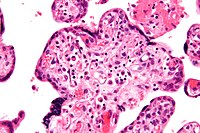
Photo from wikipedia
Abstract Background Heat stress (HS) is a major environmental effect on sheep production. Hereby, we estimated the genetic (co)variance component of HS on the pre‐weaning performance of 19,022 Merino lambs… Click to show full abstract
Abstract Background Heat stress (HS) is a major environmental effect on sheep production. Hereby, we estimated the genetic (co)variance component of HS on the pre‐weaning performance of 19,022 Merino lambs by analysing the climatological index of temperature and relative humidity (recorded 30 days before lambing and after lambing) using transversal and longitudinal mixed linear models. Methods and Results The global impact of HS during the last 30 days of pregnancy was −17% for birthweight and ranged between −4% and −8% for live weight at 15, 30 days of age (W30), and average daily gain from birth at 30 days. The results from both statistical approaches showed very similar heritabilities (h 2), ranging from 0.192 to 0.237 for the direct genetic (D) effects and from 0.072 to 0.082 for the maternal genetic (M) effects, but the antagonism between (D) and (M) was higher when a longitudinal model was used. A significant genotype‐environmental effect was also found regardless of whether the climatological covariables were considered in the model. In addition, we employed D and M breeding values for W30 as an example to create a new subjacent index by first using a principal component analysis and employing the leading eigenvalues as a weighted factor that provides the information needed to identify those genotypes that maximise the response for both genetic effects over a wide range of climate–environment levels. Conclusions Our study revealed that the HS indexes of the mother during the gestation period have a significant effect on the growth of the lambs during the early stages of life.
Journal Title: Veterinary Medicine and Science
Year Published: 2022
Link to full text (if available)
Share on Social Media: Sign Up to like & get
recommendations!